Been playing Ostriv
Ostriv has been one of my favorite citybuilders/settlement sims for a while. It's set in Ukraine in the 1700s and is fairly traditional, as these kinds of games go - you can cut down trees for wood, collect clay, mine stone and iron, smelt and smith it into nails... and use all of that to build increasingly expensive structures, which craft commodities your citizens then consume.
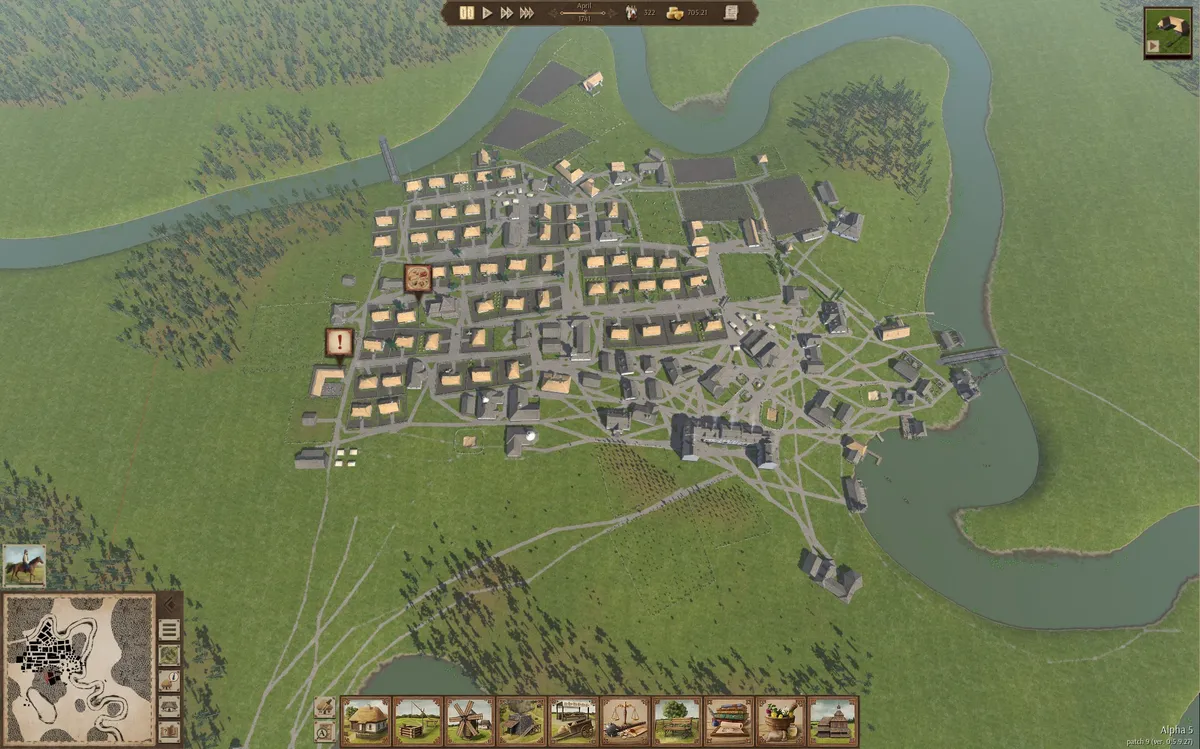
I really like, it, though! Like Foundation, it has a "desire path" road system which paints little gravel tracks where people walk. There is no grid system, and buildings can be freely placed and rotated. You can also drag the corners of some buildings around when you place them, so you can create natural-looking little street layouts where the fences around each house snap together tidily, or where multi-story row house apartment buildings line up into continuous facades.
Like most other citybuilders, it envisions a city as a series of crafting buildings which transform raw resources into commodities. But the crafting chains are pleasantly complex - for example, trees can be processed into bark, firewood, and building wood, and each you can set production targets separately for each.
It's been in early access since 2020 and is still missing a lot of late game stuff - but updates come regularly. It's the kind of thing I like to check on once a year or so.
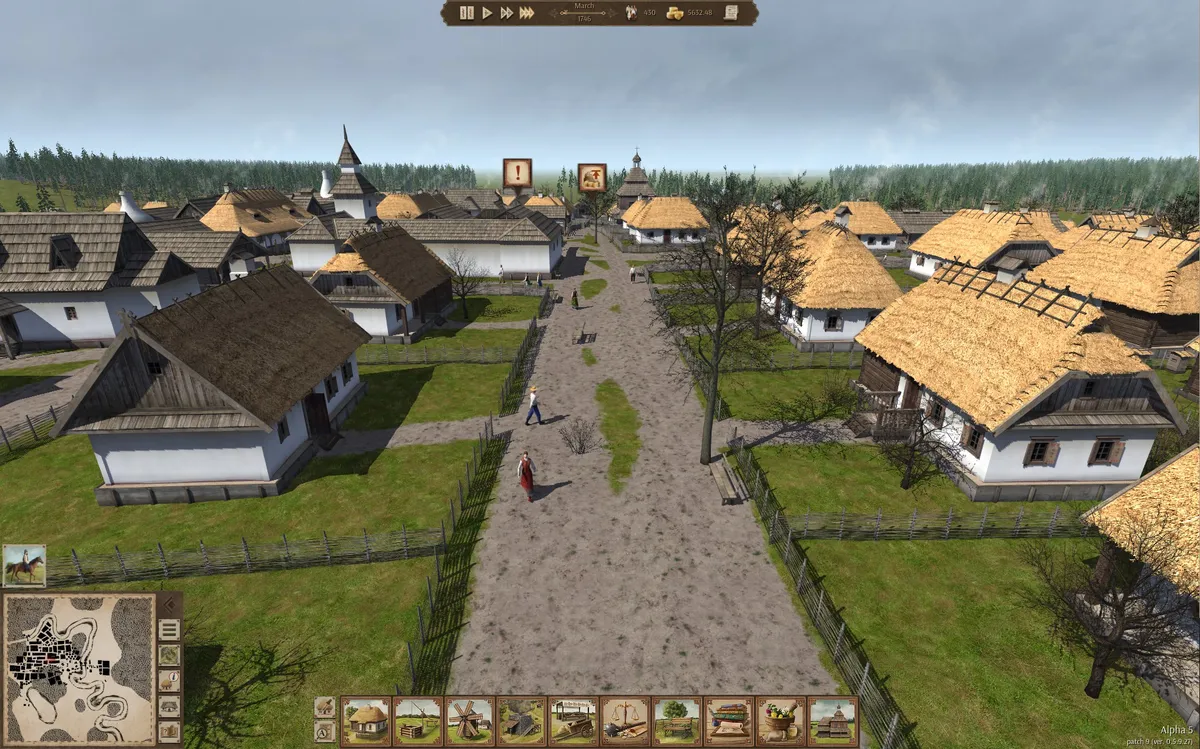
Playing it again this spring made me think for a bit about the way that citybuilders handle difficulty. There are many ways to increase difficulty over the course of a single "city" experience. Good citybuilders, I think, use several techniques at once.
More money more problems type shit
One major way to ramp difficulty is to require the player to create a very complex crafting tree, then achieve high crafting system uptime across multiple separate trees.
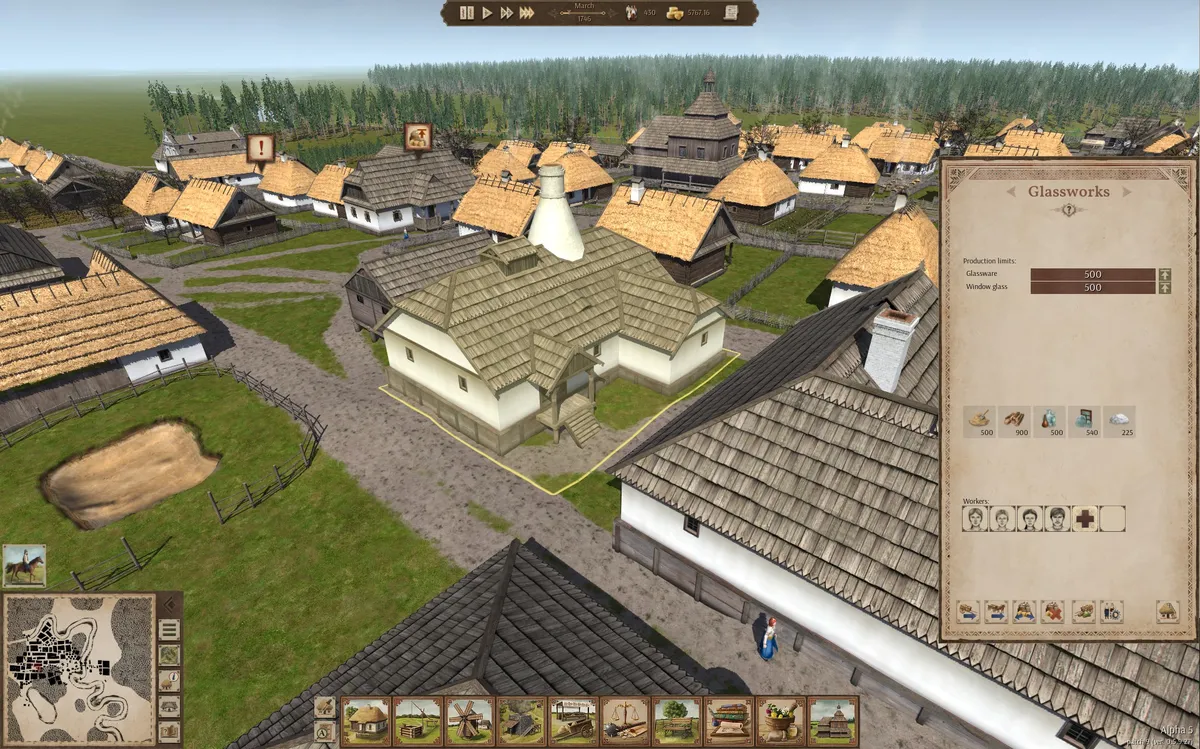
In Ostriv, glassware for a citizen's home requires a glassworks, as well as a sand pit to make the glass with. But one of the mental pleasures of a citybuilder is that the true crafting chain is never fully visible onscreen anywhere - the structures themselves have building ingredients which may also need to be harvested or processed in different structures, and you need to hold all that in your head and realize your Grand Plan slowly over a long time.
So: a glassworks needs wood, stone, nails, bricks, clay, and lye. The nails and lye are the most complex precursors. Each requires a different mine for limestone or iron ore, but each of those mines requires you to locally manufacture wheeled minecarts. Without the carts, nobody will actually mine the rocks. And you cannot make carts without "metal parts" - an iron-based commodity you cannot manufacture without a working mine. So you may have to trade for that ingredient first, using a trading post. Then you'll have to craft the carts and mine the rocks. You'll smelt the iron in a smelter, and burn the limestone to quicklime in a lime kiln. Quicklime and iron can then finally be processed into lye and nails in separate facilities.
The player grows in mastery by learning the build order, noticing the places where the build order is tricky (like an iron mine requiring iron parts), thinking laterally to utilize other systems like trade, and then tweaking details to optimize production. Truly, a city is just a bunch of factories making products! Is "civilization" itself some sort of production chain??
My first exposure to this kind of production chain difficulty was Caesar 2 and 3. In Caesar 3, the richer a household is, the more complex items it will demand. Houses could evolve through wealth states depending on what kinds of products and services it had access to. Once it can access the precise things it needs to evolve to the next step, the housing will transform, sometimes combining with nearby housing plots to create larger structures.
But housing can also devolve if it loses access to something its current tier requires. When a house devolves for want of something, it sometimes loses capacity, reducing the number of beds and filling nearby streets with homeless pilgrims who drag bags of their belongings behind them as they leave the city.
You can see a chart of housing requirements here. According to the poster:
Housing will attempt to grab goods for the next level up. Grand insulae will store, but not use, wine. To prevent accidental upgrades, restrict services.
That final sentence is very interesting - a lot of players control the difficulty of these games by manipulating whether the simulation is able to demand more complex products. In Dwarf Fortress, for example, a player might arrange for the accidental death of a noble, so that they do not have to meet that greedy bastard's eccentric production demands. It's also kind of refreshing that class and wealth in Ostriv is not a strict category system.
In Caesar 3, you can refuse to build certain service-provider buildings in order to prevent the game session from "progressing" to a higher difficulty before your crafting is fully set up. A "small insula" requires both doctors and furniture. You could build both right away... but you could also refuse to build a physician for a while, thus preventing your small insula from transforming into "medium insula" until your furniture production pipeline is more robust and can maintain better uptime.
In Ostriv, the player does need to build crafting processes with high uptime... but wealth doesn't play any role in that. This is frankly unusual - SO many games have some kind of wealth metaphor involved in crafting demands, whether that be demands from wealthy agents within the village, or demands from rulers outside the city map.
In Ostriv, households possess money, and they use that money to buy goods, but there is no mechanical recognition of citizen "class", and wealthier citizens do not demand more or better stuff. They will certainly buy more stuff... but they won't throw a fit if they can only access the same moderate spread of veggies that a poor person can.
Here is the wealthiest family in my city, a household containing a "barber surgeon". His wealth is apparent, but the game doesn't change the things he eats, change his relationship to glassware or soap, or put him into an ontologically different category from other human beings. He's simply an agent who can buy more shit than the other agents in the game - and be taxed quite a lot more, too! I can tax his profession separately from everyone else... which I MUST do, or he'll soak up all the money in town and sit on it. Too real!
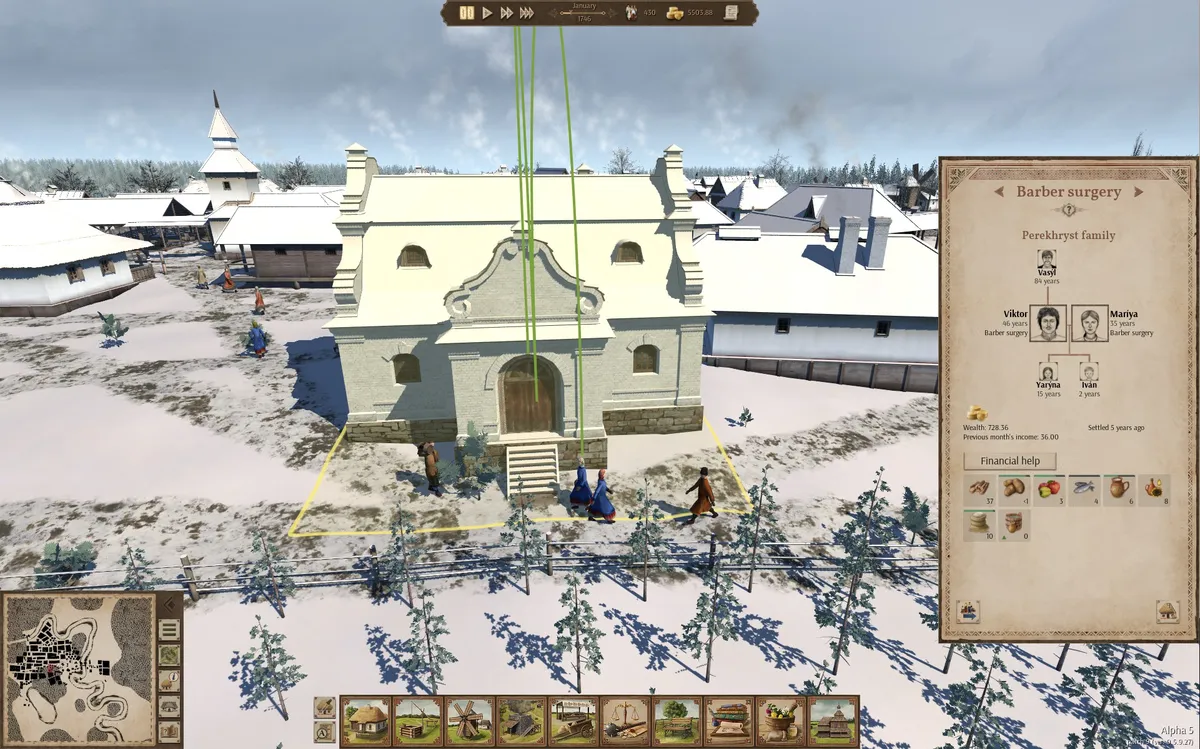
Instead of wealth-demands-more-goods, Ostriv uses a couple different systems to motivate high crafting uptime.
- Seasons can stress production chains. Harvest occurs in the fall, so the player may run out of food in the summer. If they have cows, sheep, or pigs, the player could choose to slaughter a lot of livestock in the summer to survive a dearth of grain and veggies. They can also make robust crafting systems for export goods, then sell those goods to buy food from traders. The more things they're producing, the easier it is to get basic essentials back in stock by trading or cashing in other commodities. This kind of thing is pretty common in settlement sims.
- Less common, however, is the game's seasonal staffing mechanic. Winter shuts down farms and fishing docks, and the player can choose to de-staff these facilities in the winter. Planting season, on the other hand, demands so much manpower that citizens will leave their normal jobs to go help in the fields. This creates a lot of staffing instability across many different systems. Having a larger number of more robust crafting chains may allow the player to micromanage everyone's seasonal jobs without ever leaving the town completely poor or hungry. Here's a farm hiring tons of children to sow the fields in spring:
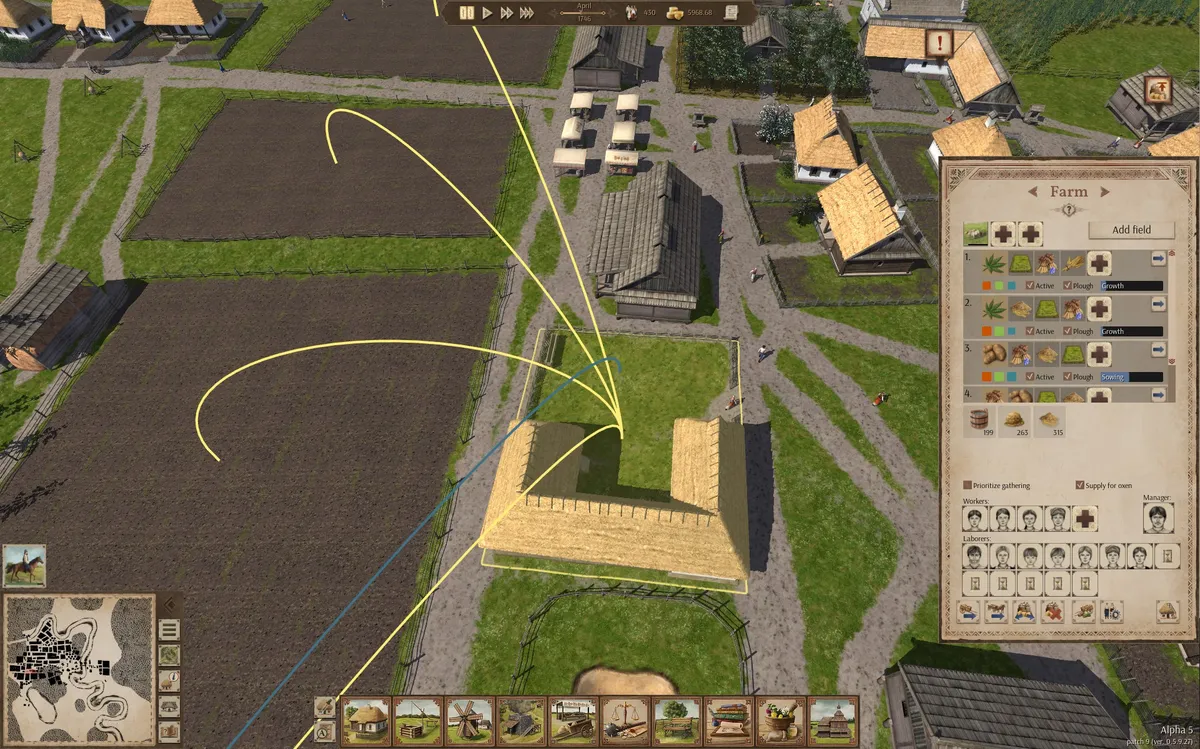
I'm not sure if Ostriv is ever going to add a mechanic where a citizen demands something from the player. That kind of thing is so, so common in citybuilders that it's kind of refreshing for Ostriv to not have it. Off the top of my head, in addition to Dwarf Fortress and Caesar, Foundation, which also has desire paths and tweakable buildings, has a system where "leveled up" peasants demand more expensive luxuries.
This stuff is so common in other games that I actually took a little while to realize that Ostriv does not have this mechanic. I remember rushing to produce meat and butter, then realizing that nobody was going to demand it from me. This feels intentional... but the fact that nobody is demanding glassware, earthenware, or soap feels more like a loose end from the early access process. I produce it only so that my citizens will buy it and generate tax revenue for me!
More people, more... simulation fidelity
Another thing you see occasionally in citybuilder games is a simulation which increases in fidelity as the city grows. Ostriv does a bit of this, too. I find this technique particularly interesting!
It's one thing to imagine that wealthy people might demand more and more expensive things from their mayor as they settle in a town. But it's inherently preposterous to imagine that some elements of the human experience might only "come online" depending on how many humans live together in the same municipality!!
For example, injuries and sickness don't seem to "turn on" in Ostriv's simulation until the town has 200 people. Shortly after I hit 200 residents, my citizens began constantly breaking their hands and legs, catching the flu, and dying of illness. Before that, they only died of old age! It was very silly and fun to notice the game suddenly start killing a ton of my guys in punishment for me not building a barber-surgeon in time.
So I tried to make sure that everyone in the city had the money and the barber-surgeon proximity to heal their wounds. I failed at this a bit, and now one of my families consists of three orphaned children. Their poor father was just outside the effective range of the barber-surgeon, and I watched him sadly walk to the bench outside his house and sit there every day for, I think, three years, until he simply died. Poor man! Here he is:
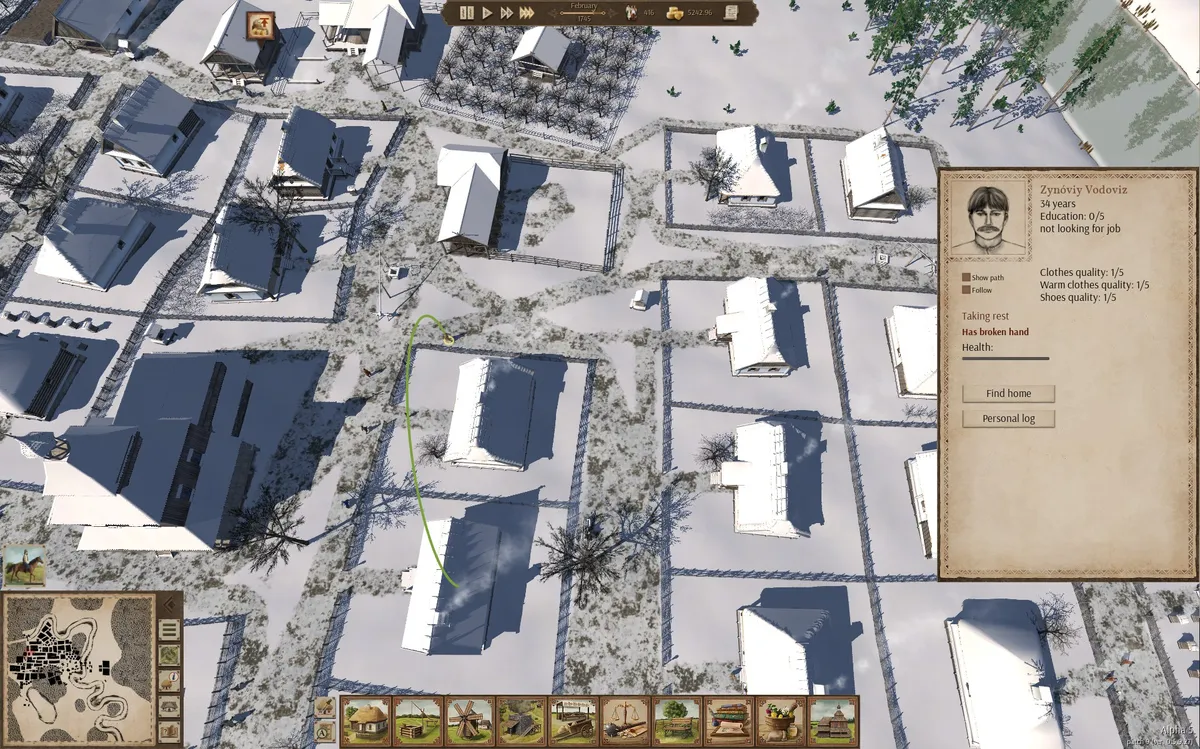
Ostriv also suddenly starts demanding that you provide the town with "entertainment" at 400 citizens exactly. If you have 400 people in your town, but no working tavern, people will suddenly stop moving in. You'll need to construct the farms and production facilities needed to make beer and distill liquor, then build a tavern, then make sure the family which moves into it can keep it in stock. If your taverns are all out of stock of beer at the same time, you won't be able to accept new migrants until the inkeeps walk themselves over to the closest market stall and buy beer. Which means that you also need good market stall coverage, and that your tavern families must have enough money to pay for beer.
I like to imagine the potential migrants looking at some list of potential homes and saying, "Four hundred people and no BAR? Damn, that's outrageous!" and rushing over to become Person 400 at the next town over (which of course has precisely 399 citizens, I imagine). It is even funnier to imagine that they are keeping close enough attention to know that they can start moving in exactly when the innkeep walks over to the market stall and buys beer to stock his home business. I like to imagine them standing on the next hilltop over with a telescope, tracking him through the streets, or something.
It's very unusual to me that the game chooses soft pressure for some parts of the "simulation," and very hard, unrealistic pressure for others. The developers clearly looked at the resources needed for health and entertainment systems, then chose some population count at which the player could be expected to maintain them, then created some kind of negative stimulus to punish the player for failing at either.
For some reason, however, injuries are simulated, but entertainment is not. Citizens do not have an "entertainment" stat, even after 400 pop count. Citizens do not move in to your town, seek entertainment, and then move out if they fail to find it.
They just don't move in until the bar contains alcohol.
I love the idea of a city simulation increasing in detail and fidelity over time. I can imagine a bunch of ways to provide narrative context to a system like this... for example, Shel and I were discussing on discord that it might be possible to create a space-themed citybuilder where some services are provided by off-planet supply ships until a narrative event destroys them.
It'snot very "realistic" to turn elements of the human experience off and on as the game progresses, but I think there are ways to make it feel, at the very least, motivated. None of these games are even remotely "realistic," even when they - like Ostriv - wear their historical references proudly.
Regardless, I love this game, and I'm going to continue checking up on it over time. I fully expect to come back in the future and find that none of these observations really apply anymore. Like many highly systemic games, citybuilders are very good for early access. Each new system recontextualizes the others. It's great stuff!!